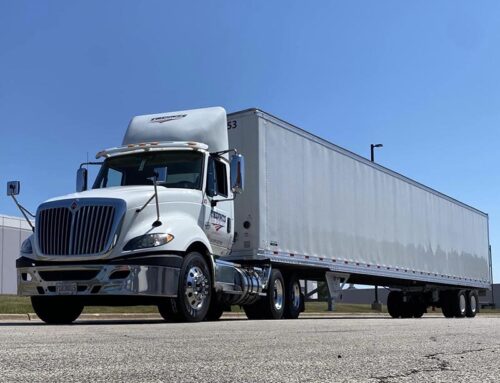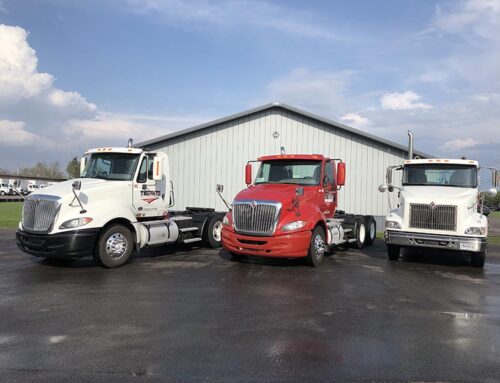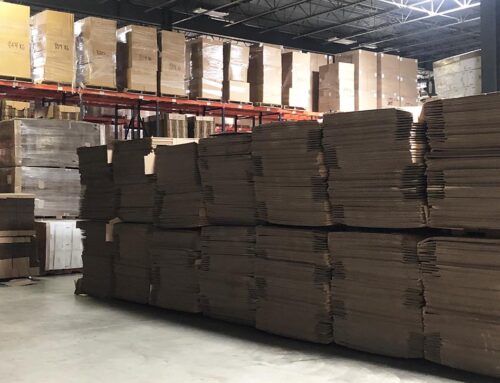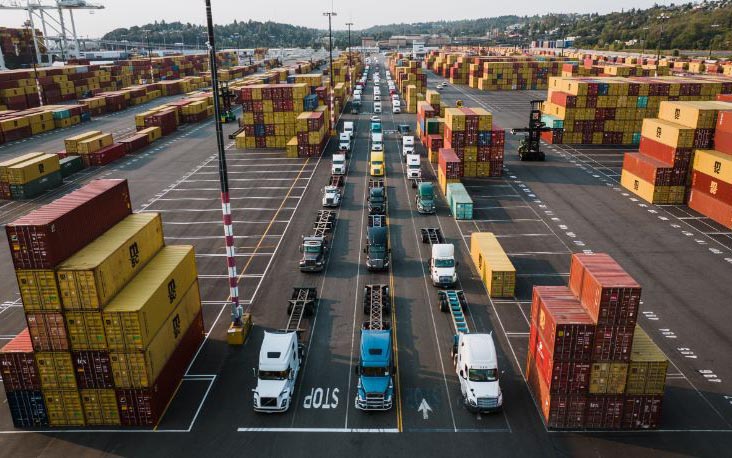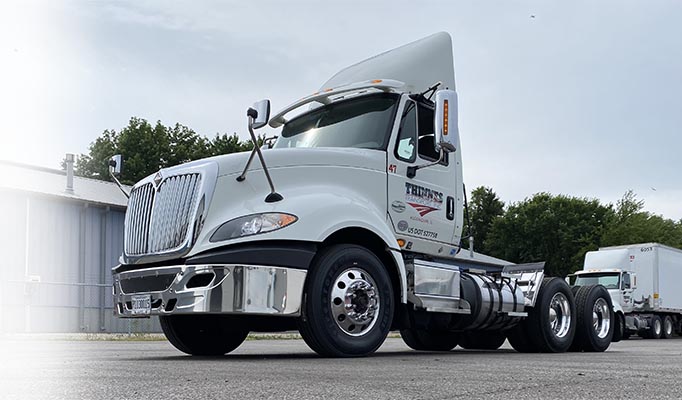Essential Factors to Consider Before Choosing Between FTL and LTL Trucking Services to Move Cargo Across Illinois

Whether you’re a first-timer or an experienced shipper looking for the best way to move cargo across Illinois, you’ve most likely found yourself here looking for guidance related to choosing from two of the most common trucking service types – full truckload shipping (FTL) and less-than-truckload shipping (LTL).
These two shipping services are an essential part of inland freight and virtually every supply chain across different market sectors. Therefore, in this post, we’ll share a brief comparison of a full truckload shipment vs. less-than-truckload shipping and help you choose the best service for your specific shipping needs.
Full Truckload (FTL) shipping and Less-than-Truckload (LTL) shipping are two common shipping options for transporting goods by truck. Here are some key differences between the two:
Full Truckload Shipping Explained
FTL shipping is the process of moving large shipments of cargo for one client. As a result, shippers opting for full truckload shipping have full control over the freight vehicle’s entire shipping space as well as the shipping schedule and loading/unloading stops. FTL is the go-to method of freight transport for businesses looking to ship heavy or large amounts of cargo. Some shippers also use it to ship fragile or perishable goods and materials quickly and safely. Overall, FTL trucking is a reliable and efficient way to transport goods across long distances and can be a cost-effective option for businesses that need to ship large quantities of goods.
Less-than-Truckload Shipping Explained
LTL trucking refers to a partial truckload, which is a transportation service in which a single shipper’s goods are transported with goods from other shippers on the same truck. The goods are consolidated onto the truck and delivered to the destination, where they are sorted and unloaded for delivery to their final destination.
Truckload vs. Less-than-Truckload – Which Service Should You Choose for Moving Cargo Across Illinois?
Before deciding between truckload and less-than-truckload shipping services, consider the following factors to make a more informed decision:
1. Shipment Size and Volume
As a general rule of thumb, you should opt for FTL shipping if your shipment weighs over 15,000 pounds or takes up more than 10 pallets. However, there’s no set rule for dimension or size limits as most shipping companies in Illinois establish their own restrictions according to their trailer size, clearance, and door types. FTL shipping is typically used for shipments that are large enough to fill an entire truck and it is a cost-effective option for shipping goods that are time-sensitive or require special handling. It is a common choice for businesses that need to ship large quantities of goods over long distances. , while LTL shipping LTL trucking is a cost-effective option for shipping smaller shipments that do not have enough product to fill an entire truck, or for those that only need to ship goods on a regular but not frequent basis.
2. Cargo Type
Less-than-truckload (LTL) shipping is suitable for smaller shipments that do not require the use of a full truck. Some examples of cargo that are well-suited for LTL shipping include:
- Smaller, lightweight packages and pallets: LTL carriers often have weight and size restrictions, so smaller packages and pallets are typically a good fit.
- Multiple small shipments going to the same destination: LTL allows multiple parties to share the cost of transportation by shipping smaller quantities of goods on the same truck.
- Irregularly shaped or fragile items: LTL carriers often have specialized equipment and handling procedures for irregularly shaped or fragile items to ensure they are transported safely.
- Hazardous materials: LTL carriers may have experience and training in handling hazardous materials, making them a good choice for shipping these types of goods.
- Less time-sensitive shipments: LTL shipping may be slower than full truckload (FTL) shipping due to multiple stops, so it may not be the best choice for time-sensitive shipments. However, it can be a good option for less time-sensitive shipments that do not require a full truck.
Full truckload (FTL) shipping is suitable for large shipments that require the use of an entire truck. Some examples of cargo that are well-suited for FTL shipping include:
- Large, heavy shipments: FTL is best for shipments that fill an entire truck and require specialized equipment for handling and loading.
- Time-sensitive shipments: FTL allows for a more direct route and faster delivery times, making it a good choice for fragile/perishable goods or time-sensitive shipments.
- Shipments going to a specific location: FTL is typically more suitable for shipments going to a specific location rather than multiple destinations.
- Large quantities of the same item: FTL is well-suited for shipping large quantities of the same item because it allows for the efficient use of space on the truck.
- Perishable or temperature-sensitive items: FTL can be a good choice for shipping perishable or temperature-sensitive items because it allows for more control over the transportation process and minimizes the amount of handling required.
3. Shipping Budget
If you’re looking to reduce costs at the expense of longer delivery times and relatively higher damage risk, look no further than LTL shipping since the cost of shipping will be shared with other shippers. Overall, LTL trucking is a flexible and cost-effective option for shipping smaller quantities of goods and can be a good choice for businesses that do not have large, frequent shipping needs. If you want full control over delivery times and handling from pickup to transit and delivery, then FTL is the way to go. Full truckload (FTL) shipping is generally more expensive than less-than-truckload (LTL) shipping because FTL requires the use of a whole truck, while LTL allows multiple parties to share the cost of transportation by shipping smaller quantities of goods on the same truck. However, FTL can be more cost-effective for larger shipments or when shipping time is a major factor.
Of course, FTL shipments tend to be larger and heavier, which can increase the cost of transportation. Opting for FTL would entail a premium price due to higher security, less risk, faster delivery, and safer handling.
4. Handling
By choosing for FTL services, the truck driver will take your cargo straight to the destination after loading. The truck is dedicated to the shipment and does not make any additional stops to pick up or deliver other shipments. In contrast, with LTL shipping, you can expect cargo to be loaded and unloaded multiple times before it reaches its final destination. FTL is typically more suitable for shipments going to a specific location, while LTL is better for shipments going to multiple destinations.
However, opting for LTL doesn’t mean your cargo would be damaged, as most reputable trucking companies in Illinois ensure your shipment is packaged properly. Increased handling only increases the chances of potential damage. If you’re looking to move fragile/perishable goods or time-sensitive shipments, we recommend opting for a dedicated truck and use full trailer load services.
5. Delivery Timeline
FTL transit is virtually in a straight line as drivers pick up freight from the shipper’s location and drive straight to the delivery destination. Delivery times are more predictable since they can be calculated using metrics such as total mileage, average speed, idling times, traffic conditions, and hours of service. Predicting delivery times can be difficult when opting for less-than-truckload shipping unless the trucking company provides a guaranteed delivery time (which usually happens if you opt for premium delivery packages). If your shipment needs to be delivered on a tight schedule, FTL may be the better choice because it allows for a more direct route and faster delivery times. LTL shipments may be slower because they may need to make multiple stops to pick up and drop off other shipments.
Conclusion
As you can see, the decision between full truckload vs. less-than-truckload shipping is relatively straightforward. LTL shipping service is ideal for shipping smaller shipments with flexible delivery schedules. Similarly, FTL shipping is the best option for moving large amounts of cargo exclusively, with more control over the pickup, handling, and delivery times.
Regardless of the type of method you opt for, you also need to choose the right freight transport company to ensure quick and safe delivery. Thinnes Transport is one of the oldest and most reputable local shipping companies in Illinois, operating within a 100-miles radius of Chicago.
So, if you’re looking to move cargo within our operating areas, feel free to get in touch to request a quote and leverage over 40 years of freight logistics expertise and experience at every touchpoint, from pickup to transit and delivery.

